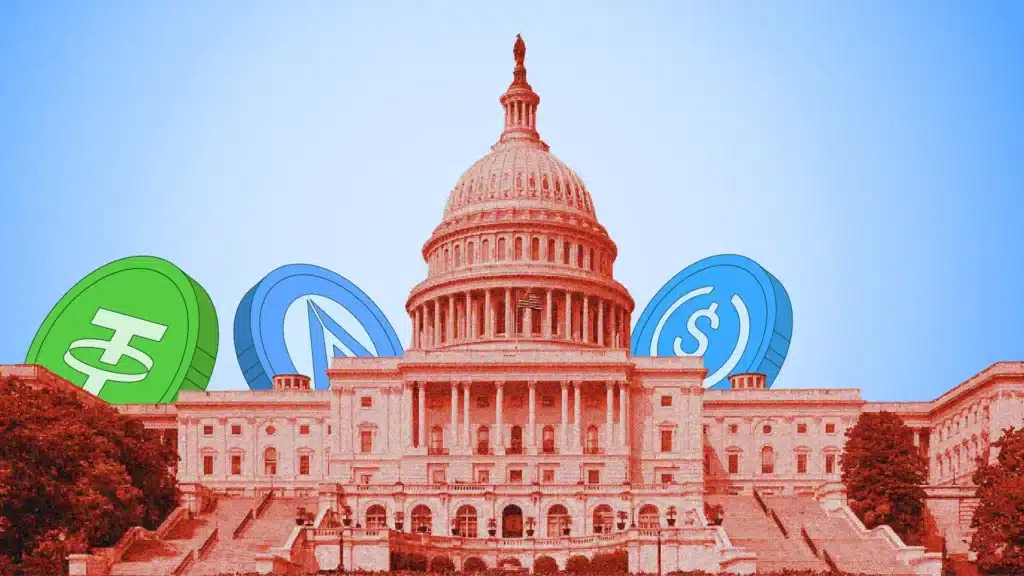Understanding the US GENIUS Act: A Focus on Stablecoins

The United States is advancing its regulatory framework for the cryptocurrency industry with a focus on stablecoins through the proposed Guiding and Establishing National Innovation for US Stablecoins (GENIUS) Act. This legislation aims to establish clear guidelines for the issuance and management of stablecoins, which are digital currencies pegged to reserve assets like fiat currencies or gold. Recently, Senator Elizabeth Warren highlighted the importance of regulating stablecoins to prevent private companies from creating their own versions of the US dollar. The bill has gained momentum after being approved by the House Financial Services Committee, moving it closer to final approval in the Senate.
Key Features of the GENIUS Act
Introduced to lawmakers in February, the GENIUS Act is sponsored by four key figures, including Tim Scott, the Chairman of the Senate Banking Committee. The proposed legislation aims to create a structured framework for stablecoin issuance in the US. It will require institutions, such as Meta, to adhere to specific guidelines if they wish to obtain licenses for stablecoin issuance. The bill outlines reserve requirements for both existing and potential stablecoin issuers, ensuring that these entities operate under defined protocols.
Additionally, the GENIUS Act proposes a supervisory regime for stablecoin businesses. Large-scale issuers with tokens valued at $10 billion or more, as well as banking institutions, would fall under the strict oversight of the Federal Reserve. Non-bank entities of similar scale would be monitored by the Office of the Comptroller of the Currency. States may also have the authority to regulate smaller stablecoin issuers independently, allowing for a more localized approach to regulation.
Support and Anticipation for the Bill
The GENIUS Act has garnered significant support from various stakeholders in the crypto industry. Paul Atkins, head of the SEC’s Crypto Task Force, expressed optimism about the bill’s passage, stating, “We have every expectation now that it’s going to pass.” Senator Bill Hagerty also voiced his support, criticizing the previous administration’s lack of clear regulatory guidelines, which he believes hindered innovation in the stablecoin sector. He emphasized that the GENIUS Act could pave the way for a robust framework for stablecoin issuance.
The approval of the bill by the House Financial Services Committee in April marks a critical step forward in the legislative process. As the bill progresses, industry leaders are hopeful that it will provide the clarity and structure needed to foster innovation and growth within the stablecoin market.
The Growing Importance of Stablecoins
Stablecoins are increasingly recognized as a viable solution for fast, secure, and cost-effective cross-border transactions. Tim Scott, the Chairman of the Senate Banking Committee, highlighted the transformative potential of stablecoins in the financial sector. He noted that these digital currencies could enhance transaction efficiency and drive demand for US Treasuries, showcasing their significant benefits.
The interest in stablecoins is not limited to the US. Other countries, including Hong Kong, have also moved forward with their own stablecoin regulations. Traditional financial giants like Visa, Mastercard, and PayPal are exploring stablecoin-related services, indicating a growing acceptance of this technology in mainstream finance. Furthermore, blockchain companies like Polygon are focusing on stablecoin initiatives to meet rising institutional demands.
A recent report from Standard Chartered predicts that the stablecoin market could expand dramatically, potentially reaching a valuation of $2 trillion within the next three years. This anticipated growth underscores the increasing relevance of stablecoins in the global financial landscape as regulatory frameworks continue to evolve.
Observer Voice is the one stop site for National, International news, Sports, Editor’s Choice, Art/culture contents, Quotes and much more. We also cover historical contents. Historical contents includes World History, Indian History, and what happened today. The website also covers Entertainment across the India and World.

